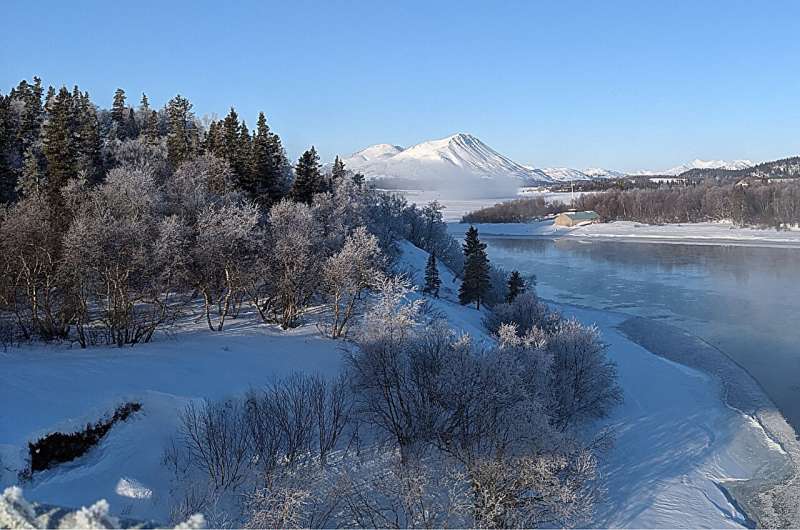
Temperatures are rising rapidly in the Arctic, raising questions about how communities are coping in the shifting climate. A team led by Penn State researchers reviewed studies from the past 30 years to examine whether these challenges are causing people to migrate out of the area—or if, and why, they’re deciding to stay.
The researchers, who published the findings in Regional Environmental Change, found little evidence of individuals or households migrating out of the polar regions of Alaska and northern Canada as a result of climate change. Factors such as family, culture and a sense of community led to people deciding to stay, even in the face of climate-related challenges.
However, the researchers did find evidence of whole communities relocating when climate change led to deteriorating conditions. For example, the Chevak Native Village in Alaska already has relocated. In another example, the village of Newtok—a Yup’ik community in Alaska—has spent millions of dollars on relocation efforts, which already have taken more than 30 years and are not yet complete.
“Arctic communities under environmental threats are forced to relocate because flooding, erosion and storms are destroying their homes and infrastructure,” said the paper’s lead author, Guangqing Chi, professor of rural sociology, demography and public health sciences in Penn State’s College of Agricultural Sciences. “Community relocation from climate-related environmental changes is a widely considered option in Alaska, but it is an expensive process.”
As of 2022, the researchers said, 144 of the 229 Alaska native tribes were under environmental threats, including 29 communities experiencing significant erosion, 38 communities facing significant flooding and 35 having problems with thawing permafrost.
Of those, 15 are exploring relocation, which includes moving housing and public infrastructure. But many communities that are facing environmental threats cannot meet the requirements of federal disaster mitigation programs and are ineligible for disaster funding.
Chi said the findings highlight the need for further research, as well as recommendations for tackling the unique challenges of studying this topic.
“Many of these communities are facing multiple challenges, including thawing permafrost, declining sea ice cover, coastal erosion and extreme storms,” said Ann Tickamyer, a co-author and professor emerita of rural sociology and demography at Penn State. “As critical climate tipping points are reached, threats to these communities’ viability, health and livelihoods will only increase.”
But despite temperatures in the Arctic rising four times more quickly than in lower latitudes, the researchers said the region largely is absent from studies and debates on how climate change is fueling migration.
“This is an important gap because of the severity of Arctic climate change impacts and the regional predominance of Indigenous communities—many of which have already been negatively impacted by centuries of racism, cultural loss and political disenfranchisement, especially in Alaska,” Chi said.
To arrive at their conclusions, the researchers examined peer-reviewed studies on the factors contributing to migration in the Arctic—including those related and not related to the climate and environment.
After their analysis, the researchers found no evidence of individuals or households moving because of shifts in the climate. Instead, individuals and households that relocated out of the Arctic tended to do so because of factors that influence migration everywhere, such as jobs, education and health care.
“For example, a study of 43 Alaska towns and villages—which covered places most threatened by climate-linked erosion and flooding—found no indication of enhanced out-migration between 1990 and 2014 compared to places without climate risk,” said co-author Shuai Zhou, a former doctoral student in rural sociology and demography at Penn State and currently a postdoctoral associate at Cornell University.
Chi said the review is part of the Pursuing Opportunities for Long-Term Arctic Resilience for Infrastructure and Society (POLARIS) project. The initiative includes experts from different disciplines and institutions working toward helping Arctic Indigenous populations adapt and become resilient to environmental changes.
The team currently is conducting surveys and in-depth interviews to understand climate change impacts on community well-being and to seek indigenous knowledge in dealing with climate extremes and hazards.
In the future, the researchers said they plan to conduct new research to better understand the challenges faced by Arctic communities, as well as the potential solutions.
More information:
Guangqing Chi et al, Climate impacts on migration in the Arctic North America: existing evidence and research recommendations, Regional Environmental Change (2024). DOI: 10.1007/s10113-024-02212-9
Citation:
Many people in the Arctic are staying put despite climate change, study reports (2024, May 10)
retrieved 10 May 2024
from https://phys.org/news/2024-05-people-arctic-staying-climate.html
This document is subject to copyright. Apart from any fair dealing for the purpose of private study or research, no
part may be reproduced without the written permission. The content is provided for information purposes only.







